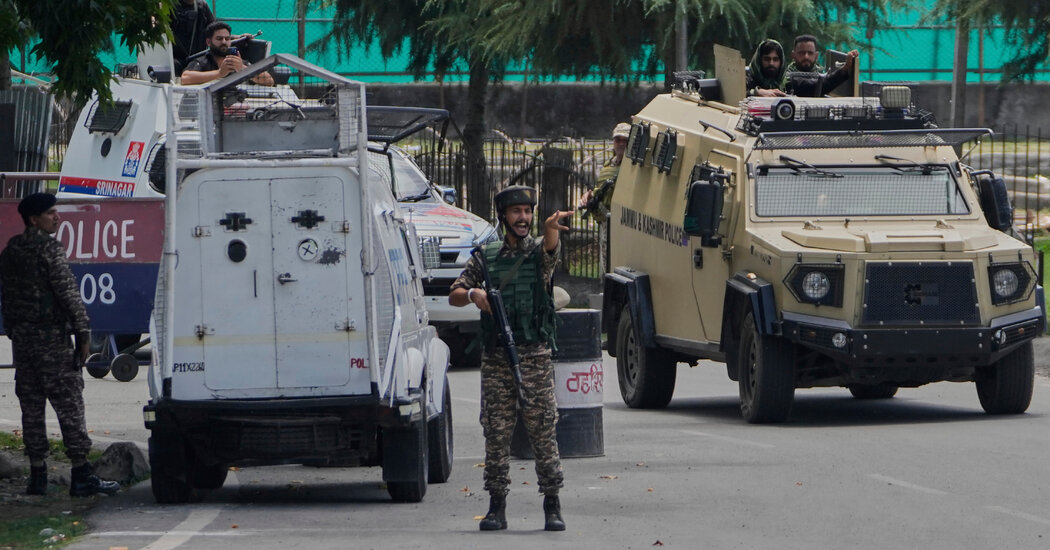Indian security forces gunned down three assailants they said were involved in a deadly terrorist attack in Kashmir this spring, officials said on Tuesday, three months after the slaughter of civilians in a scenic park started a military conflict with neighboring Pakistan.
Amit Shah, India’s home minister, told the country’s Parliament that security forces had followed the men in “high-altitude forest” in the months since the April attack that killed 26 civilians, almost all of them tourists. The soldiers finally killed them in a shootout on Monday near the city of Srinagar, the capital city of India’s Jammu and Kashmir region.
Some Indian news outlets reported the killings on Monday, when the Indian Parliament began a debate on the government’s handling of its conflict with Pakistan. But officials had urged caution, as they were still identifying the bodies to confirm they were those wanted over the attack in the Pahalgam area.
Mr. Shah told Parliament on Tuesday that all three of the militants killed were Pakistani nationals and were all were involved in the terrorist attack.
Prime Minister Narendra Modi’s administration has come under pressure from the opposition for failing to track down the attackers for so long and because of how it conducted the clash with Pakistan, including how the escalations between the two nuclear-armed neighbors ended under pressure from President Trump.
Even after India went into battle with Pakistan, accusing its neighbor of supporting militants who target India, many details about the incident were not publicly disclosed, including the exact number of attackers and their identities. There have also been questions over how such a security lapse could happen in one of the world’s most militarized regions. Mr. Shah, the home minister, did not make it clear whether any of other attackers remained unaccounted for.
“It has been 100 days, and this government has not been able to catch those five terrorists,” Gaurav Gogoi, a leader of Indian National Congress party, the main opposition, said in Parliament on Monday before news reports of the killings started filtering through.
New Delhi has long accused Pakistan’s military of using militancy for proxy warfare by harboring and training groups who wage violence in India, particularly in the Kashmir valley. The region has been disputed ever since Pakistan was cleaved from India at the end of British colonial rule.
Pakistani officials have accused India of starting the military conflict without providing proof that the militants behind the Pahalgam attack were tied to their country.
After the terrorist attack in Pahalgam — where Hindu men were separated from their families and killed after being asked about their religion — Mr. Modi vowed military action against Pakistan. He also paused India’s participation in a water-sharing treaty and downgraded its already minimal diplomatic ties.
But after India’s military action, its air forces suffered unwanted setbacks.
As Indian jets flew along the border before dawn, targeting what were identified as terrorist camps inside Pakistan, the Pakistani side managed to shoot down some of the Indian aircraft. The attacks brought back bitter memories of similar incident in 2019, when Pakistan managed to capture an Indian pilot after shooting down his jet in a similar buildup of tensions.
Indian officials remained largely silent about their losses as they extended their strikes to Pakistani military targets in the subsequent days of a conflict marked by heavy use of drones and missiles from both sides. Satellite images showed that they had managed to inflict damage on Pakistani military installations.
“In any exam, what matters is the result,” Rajnath Singh, India’s defense minister, said during the parliamentary debate on Monday. “If a student returns with good marks, it’s their marks that should matter to us. We shouldn’t be concerned about whether their pencil broke or they lost their pen during the exam.”
The manner in which the fighting ended has also brought scrutiny on Mr. Modi.
Mr. Trump made a surprise announcement from Washington that his officials had forced the agreement for a cessation of violence on both countries by using trade threats as leverage. India quickly tried to play that down, saying the request for a cease-fire had come from the Pakistani side under pressure from India’s military assaults.
But to New Delhi’s embarrassment, Mr. Trump has repeated his claim more than two dozen times — something Mr. Modi’s opposition has jumped on.
In the raucous parliamentary debate on Monday, one Indian opposition lawmaker, Deepender Hooda, took a jab at Mr. Modi’s struggle with Mr. Trump by suggesting an out-of-the-box trade lever of his own.
“Either shut Donald’s mouth,” he said, “or shut McDonalds in India.”
Mujib Mashal is the South Asia bureau chief for The Times, helping to lead coverage of India and the diverse region around it, including Bangladesh, Sri Lanka, Nepal and Bhutan.
Hari Kumar covers India, based out of New Delhi. He has been a journalist for more than two decades.
The post India Says It Killed 3 Militants Behind Spring Terrorist Attack in Kashmir appeared first on New York Times.




